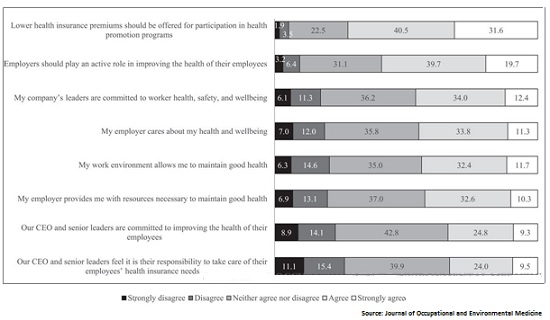A new study hopes to settle the debate regarding workplace health promotion and whether or not it’s good for employers to get involved with employees’ wellness. Turns out, good or bad, there’s a communication breakdown. Around two-thirds of workers surveyed are happy to have their employer get involved in their health, but less than half know their company has a program.
Over three-quarters of employers (a majority of whom had fewer than 500 employees) reported success from their health wellness programs for various factors, including 83.6% who said it improved workers’ health, 83.3% who said it increased productivity, and 73.6% who said it improved healthcare costs. This is all according to a report published in the Journal of Occupational and Environmental Medicine.
The interesting thing was, even though 80.6% of employers surveyed said that they offered wellness programs, only 45% of employees said that they had been offered such a program. The reason for this could be employers and employees having different opinions on what constitutes a wellness policy, the robustness of the offerings in the program, or the awareness of these programs. If only half as many employees as employers say that wellness programs exist, it shows a clear need to better communicate these campaigns to employees.
Socially supportive culture
It takes more than just some physical modifications to create the right environment to foster health. It is also important to modify social norms, the report says. Creating a socially supportive environment means having support from leaders by making managerial accountability part of the wellness program, as well as creating a wellness program that aligns with the goals of the business. The report found that when managers support and participate in the program it increases success.
The survey showed that employees in a small business were more likely to say they were provided with the resources to stay healthy than employees in large companies (46.2% over 38.8%). Small company employees were also more likely to agree that their CEO felt it was part of their responsibility to care for the health insurance needs of their employees.

A total of 59.6% of employees welcomed the idea of their employer getting involved in their health and wellbeing. However, less than half of the respondents agreed that their leaders were committed to the health, safety, and well-being of their employees. Only 44.1% of the employees surveyed said that their work environment was conducive to good health.
A majority of employees (54.7%) report participating in wellness programs that were offered to them. There were a few reasons for not participating, including not being interested in the program, feeling they don’t need any additional help to maintain their health, and feeling that the things offered in the program are things they already do by themselves.
The report concluded that creating a culture of health means that all levels of the organization buy into it. This starts at the top with senior management. Caring about — and being committed to — the health of employees is something that permeates throughout the company. It is exemplified by program participation ensuring support from managers at all levels, and getting these managers to lead by example.
